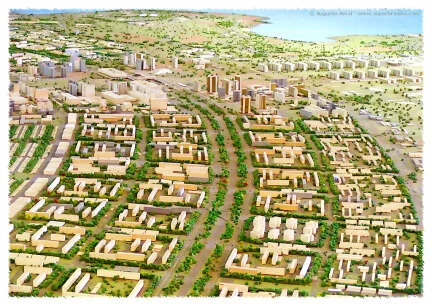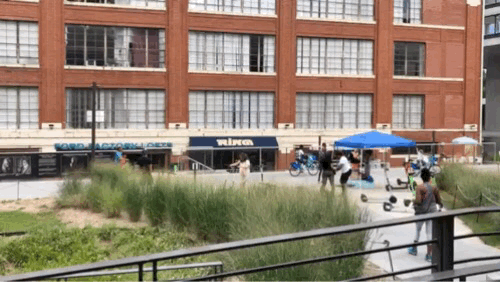On Designing Livable Cities for All
Trees are still the most effective and affordable way to sequester carbon. On average, a single tree sequesters 50 lbs of carbon dioxide a year. Over the average 40-year lifespan of most urban trees, that’s roughly 1 ton of carbon dioxide per tree. With an estimated 5.5 billion trees in urban areas alone, you get 137.5 million tons of carbon sequestered from the atmosphere from urban forests every single year and 5.5 billion tons over 40 years — a small investment with a big ROI.
On Building the Future
My goal with this newsletter is to learn in public about the ideas, concepts, and companies that give us hope for a future where our built environment makes us healthier, not sicker. I’ll explore the promises of climate impact, the science, how it impacts you, and how you might get involved.
Testing Concepts on Reddit, Learn from Burns
It's easy to get lost in these trendy concepts that are intentionally designed to conjure an image. They quickly take me down a path of exploration where I might combine several shiny ideas to create my own little concept city. But just as easily as these ideas come, they can and should be challenged.
In Atlanta, the BeltLine Approaches Climate Change by Design
Not only does the BeltLine aim to revitalize unused and abandoned railways, but this rails-to-trails initiative is paving the way for a stronger relationship between people and their built and natural environments.
From Vision to Strategy: Why IKEA’s Urban Village Project is the Perfect Testbed for Urban Innovation
Earlier this year, I had the fortune of meeting the UVP lead at Space10 over Google Meet. We discussed the status of the project, potential timelines, and shifts in goals, guideposts, and realities. As with most projects in 2020, conceptual or not, the Covid-19 pandemic put a damper on productivity and feasibility, drawing many projects to a halt. Although I cannot speak for the Space10 or EFFEKT regarding the future of the project, it's something I continue to root for to see in our future.
How OKRs Enhance Planning for the Future of Cities
Restructuring cities to function as a tech product would help to realign the goals of the cities to match the users ("the citizens") with the features ("policies") that represent the population rather than the other way around.
In my opinion, the future of cities needs product managers. The goal of these public officials would be to understand the needs of the people and to define the goals and OKRs of their population — selecting programs and initiatives like features that accomplish those goals. In one sample case, the OKRs would optimize for several key values — improving equitability, improving access to resources, improving investment in innovation.
Oakland Slow Streets, A Call for More Data in Iterative Urban Planning
Although Oakland's approach to urban data is both underwhelming and ill-equipped, it presents an opportunity to drastically improve its approach from intercept surveys, OPD crash data, and maintenance interviews. Lightweight automated tracking and sensor-based solutions present an opportunity to collect de-personalized movement and count data that is far more accurate and functionally cheaper than people.
In Portland, 15-Minute Neighborhoods Focus on the People
Walkability may not be top of mind for the average Portland tourist like it is in New York City, but it's a clear benefit if you're staying on the Eastside of the river. Nearly every neighborhood on the Eastside of Portland features a wonderful new restaurant or neighborhood institution that anchors public thoroughfare — featuring a combination of lively walking culture with convenient corner markets and small local businesses cozily mixed in with commercial complexes, light industrial, and modern one-plus-five mid-rise apartments.
How Six Inches of Concrete Can Mean Life or Death
In 2019, 134 pedestrians were killed by drivers while walking in Los Angeles, a bustling city with a population of just under 4 million. By comparison, the Netherlands reported a total of 49 pedestrian road fatalities in 2019 in a population of more than 17 million. While any number of deaths is too much by any measure of success, it's safe to conclude that the Dutch are doing something far more effective than what's happening in one of the largest cities in the United States.
What Is A Soft City and Why Do We Need Them?
Soft may not be as sexy as Smart, but it emphasizes the small details in a city and its buildings that make our lives easier, more enjoyable, and more efficient by prioritizing the people that live in it.
Why Data Alone Won’t Save Cities
I subscribe to the notion that the design of our cities is the driving force behind our choices and behaviors. Although I’m still working on a thesis to summarize my views on cities and climate change, my general hypothesis is this:
If our behaviors control how humanity impacts climate change, then our cities are the first and last battleground for defeating the global climate crisis.












